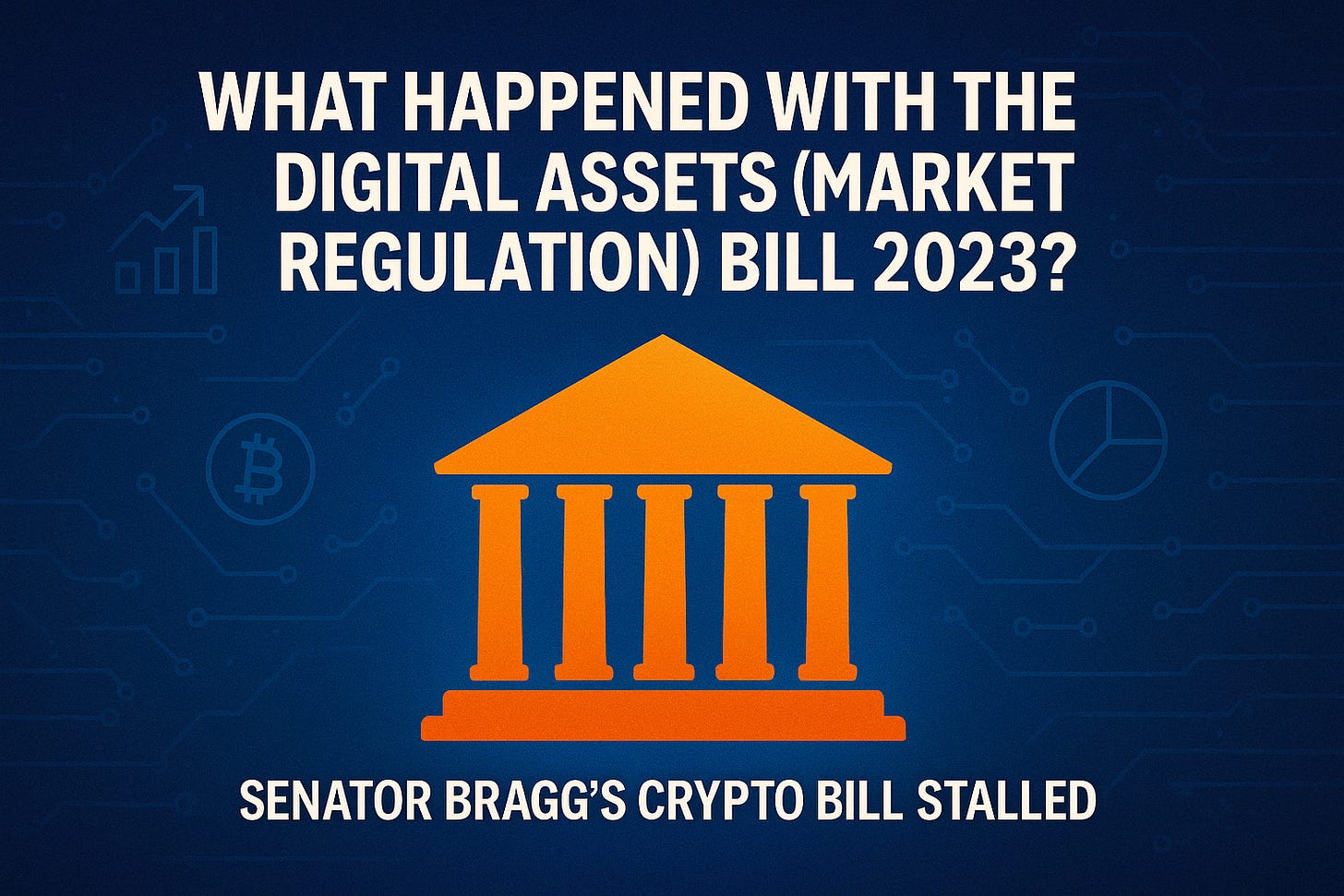What Happened with the Digital Assets (Market Regulation) Bill 2023?
Senator Bragg’s crypto bill stalled
Key takeaways:
Senator Bragg introduced the Digital Assets (Market Regulation) Bill 2023 in March 2023 to regulate crypto exchanges, custody, and stablecoins.
The bill stalled after debates in late 2023 and has not passed into law.
The Scrutiny Committee raised concerns that the bill delegated too much legislative power (leaving substantial details to rules) and administrative power without adequate justification or oversight, and questioned the justification for significant penalties.
Following an extensive 2021 study into the crypto industry by the Select Committee on Australia as a Technology and Financial Centre, chaired by Senator Andrew Bragg, a legislative proposal emerged aiming to bring regulatory clarity to the digital asset space. The committee had made numerous recommendations, many of which have not been addressed to date (read our previous analysis).
Soon after the committee's work concluded, Senator Bragg introduced the Digital Assets (Market Regulation) Bill 2023 into the Senate in March 2023.
What the Bill Proposed
The core objective of the bill was to establish an effective regulatory framework for digital asset exchanges, digital asset custody services, and the issuance of stablecoins. The stated aim was to protect consumers while fostering investment in Australia.
Key elements proposed included:
Licensing: The bill proposed a mandatory licensing regime. Anyone operating a digital asset exchange, providing digital asset custody services, or issuing stablecoins (specifically, asset-referenced tokens or electronic money tokens, excluding other financial products under the Corporations Act) within Australia would have needed a "digital asset licence" granted by the Australian Securities and Investments Commission (ASIC). Holding a recognised foreign licence could have served as an alternative in some cases.
Requirements: Licensees would have needed to adhere to specific requirements detailed in associated rules. These rules were intended to cover crucial areas like maintaining minimum capital, ensuring fair and transparent exchange operations, segregating customer funds from company funds, meeting cybersecurity standards, proper auditing, and disclosure obligations.
Central Bank Digital Currencies (CBDCs): The bill also mandated reporting requirements for Authorised Deposit-taking Institutions (ADIs) concerning information related to designated foreign CBDCs circulating in Australia.
Oversight: Under the proposal, ASIC would have been responsible for supervising licensed entities and enforcing the rules. The Parliamentary Joint Committee on Corporations and Financial Services was also to be given additional duties to oversee the implementation and ongoing regulation in this area.
Legislative Journey
The bill was introduced into the Senate on March 29, 2023. It was subsequently referred to the Senate Economics Legislation Committee for inquiry on March 30, 2023. After requesting extensions, the committee tabled its report on September 4, 2023. The bill underwent second reading debates in the Senate on September 6, 2023, and November 15, 2023. For the most current status beyond late 2023, please refer to the official Parliament of Australia website tracking the bill's progress, as it has not yet passed into law.
Scrutiny Concerns Raised
The Senate Standing Committee for the Scrutiny of Bills examined the proposed legislation in its Scrutiny Digest 5 of 2023 (issued May 10, 2023). The committee noted potential scrutiny concerns for Parliament to consider at the time, including:
Delegated Legislation: Concerns that substantial elements of the regulatory scheme's scope and operation were left to be detailed in delegated legislation (rules made later) rather than the primary Act, potentially limiting parliamentary oversight.
Penalties: Questions regarding whether the justification provided in the explanatory memorandum for the significant penalties associated with certain offences (clauses 9(3), 14(3), 18(3), 33(2)) was adequate.
Delegation of Powers: Potential concerns about the broad delegation of administrative powers allowed under clause 46(1).
The progression of this specific bill stalled after the 2023 debates. However, the issues it sought to address remain relevant as Australia continues to grapple with establishing its regulatory approach in the evolving digital asset landscape.



